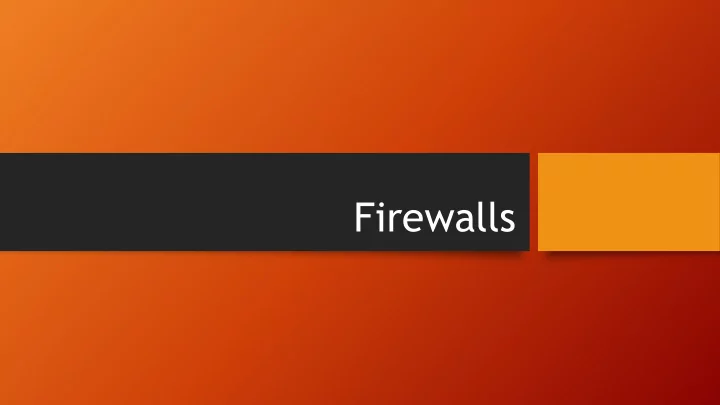

Firewalls
Summary • Brief History of Firewalls • What is a Firewall? • Why Firewalls? • Network Address Translation • Types of Firewalls • Linux/Windows Firewalls • pfSense • Blue Team Activity
Brief History • “Firewall” inspired by physical barriers intended to contain fires • Network routers were predecessors to modern firewalls • Packet Filters developed in 1987 by AT&T Bell Labs • Stateful Filters developed 1989-1990 by AT&T Bell Labs • Firewall Toolkit (FWTK) developed in 1993
What is a Firewall?
What is a Firewall? • Types of Firewalls • First Generation (Packet Filters) • Second Generation (Stateful) • Third Generation (Application Layer) • Next Generation Firewalls
Why Firewalls?
Why Firewalls?
Why Firewalls?
Network Address Translation (NAT) • Assigns IP address to hosts on LAN • External devices cannot see the internal IP Address of device • All devices on same LAN have same external facing IP Address • 1:1 NAT • ONE external IP Address to ONE internal IP Address
Network Address Translation (NAT)
Firewall Types
Packet Filters (First Gen) • Uses set of rules • Determines whether to drop or reject packet • Drop (Silently discard) • Reject (Discard and inform sender)
Stateful (Second Gen) What is this?
Stateful (Second Gen) • Determines whether to drop or reject packet • Drop (Silently discard) • Reject (Discard and inform sender) • Understands conversations happen between devices • Can monitor specific TCP Sessions • Understands that data flows are bi-directional
Application Layer (Third Gen) • All second and first gen features • Can Identify certain applications and protocols • E.g. FTP, DNS, HTTP, etc. • Next generation Firewalls use “deep packet inspection” • Intrusion detection • Identity management • Web application Firewall • Very powerful if configured properly • Proper configuration will make a Red Team sad/mad
Review of Types • Packet Filtering • Stateful • Application Layer • Next Generation
Break Back in 10 Minutes
Host Based Firewalls
Linux Firewalls • iptables & UFW (Uncomplicated Firewall) • Host based firewall • Tool for packet filtering
iptables iptables flags ● -A Append one or more rule ● -D Delete a Rule ● -I Insert a Rule ● -R Replace ● -F FLUSH chain, delete rule one by one ● -j Jump ● -s Source IP ● -d Destination IP ● -p Protocol(TCP/IP) ● -L List all rules ● -N Numerically List ● -v Verbose (More information output) ● Need more? $ man iptables ●
Example rules iptables ● Block an incoming IP iptables –A INPUT –s 10.42.X.XXX –j DROP ● ● Block outgoing IP: iptables –A OUTPUT –d 10.42.X.XXX –j DROP ● ● Block an incoming port: iptables –A INPUT –s 10.42.X.XXX –p tcp –destination-port 80 –j drop ●
Example rules UFW ● Block an incoming IP ufw deny from 10.42.X.XXX /24 ● ● Block HTTP Protocol ufw deny http(80) ● ● Allow an incoming port ufw allow from 10.42.X.XXX to any port 22 ●
Windows Firewall ● Windows Defender Firewall GUI and CLI functionality ● Built into Windows ●
pfsense ● 3 rd generation firewall Next Gen Capabilities ● ● Free
Blue Team Activity
Format • Groups of 2 • Will have your own Zoom break out room • First 30 minutes are unassisted • Exceptions for issues that are out of scope • If you think you have complete the task • Message me and I will confirm deny
Environment • One compromised domain controller • Username: Administrator • Password: Change.me!
Environment
Goals • Goal 1: Using Firewalls (pfsense or Windows) kick me out • Goal 2: Keep DNS online • Bonus: After 1 & 2 remove malware
Good luck and have fun!
Recommend
More recommend